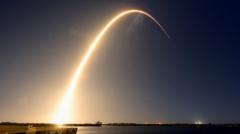On Wednesday at 01:09 local time, the Falcon 9 launched from Kennedy Space Center, carrying a robust payload of two landers from Firefly Aerospace and ispace. These missions mark a significant milestone in the rising trend of private lunar expeditions. After reaching lunar orbit, the landers will separate from the rocket to embark on their distinct explorations.
SpaceX Successfully Launches Private Lunar Missions, Paving Way for Future Exploration

SpaceX Successfully Launches Private Lunar Missions, Paving Way for Future Exploration
In a groundbreaking event, SpaceX's Falcon 9 rocket has ushered two private lunar landers into space, advancing commercial exploration of the Moon.
Firefly Aerospace's rover, named Blue Space, is projected to take around 45 days to reach the Moon. Once there, it will engage in activities such as drilling and sample collection, as well as utilizing X-ray imaging to study the Moon's magnetic field—efforts aimed at enhancing future manned missions and deepening our understanding of cosmic climate impacts on Earth.
Conversely, Japan's ispace is deploying its Resilience lander, which will take up to five months to touch down on the lunar surface. This venture will involve releasing a rover to scour the terrain and gather regolith, the loose material on the Moon's surface.
Nasa's support underscores the significance of these commercial missions, particularly as they build upon the success of Intuitive Machines, which previously became the first commercial entity to successfully land on the Moon.
Additionally, SpaceX is preparing for its seventh orbital flight test of the Starship rocket, scheduled to launch later from Texas, further demonstrating the company’s commitment to exploration beyond our planet. The future of lunar missions looks bright, with private industry playing a pivotal role in space exploration.
Conversely, Japan's ispace is deploying its Resilience lander, which will take up to five months to touch down on the lunar surface. This venture will involve releasing a rover to scour the terrain and gather regolith, the loose material on the Moon's surface.
Nasa's support underscores the significance of these commercial missions, particularly as they build upon the success of Intuitive Machines, which previously became the first commercial entity to successfully land on the Moon.
Additionally, SpaceX is preparing for its seventh orbital flight test of the Starship rocket, scheduled to launch later from Texas, further demonstrating the company’s commitment to exploration beyond our planet. The future of lunar missions looks bright, with private industry playing a pivotal role in space exploration.


















